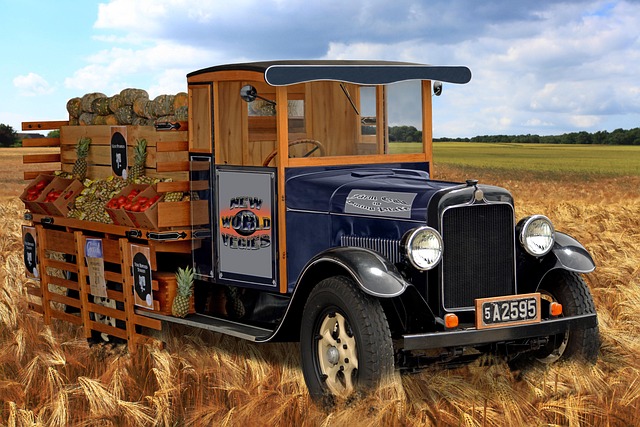Looking to register your car in California? This comprehensive guide walks you through the process, ensuring a smooth transition. California has specific car registration requirements, and understanding them is crucial before you begin. From gathering essential documents for VIN (Vehicle Identification Number) verification to selecting the right registration method, each step is designed to keep you, and your vehicle, legally compliant. Let’s dive into how to navigate this process efficiently, with a focus on critical steps like VIN verification.
- Understand California Car Registration Requirements
- Gather Necessary Documents for VIN Verification
- Perform Vehicle Identification Number (VIN) Check
- Select A California Car Registration Method
- Submit Application and Pay Fees for Registration
Understand California Car Registration Requirements

Before registering your car in California, it’s crucial to understand the state’s specific requirements. One key aspect is ensuring accurate and up-to-date information for your vehicle, starting with a valid Vehicle Identification Number (VIN) inspection. The VIN is a unique code that identifies your car, and its verification is essential during the registration process. In California, this usually involves a mobile VIN inspection or verification service to confirm the vehicle’s make, model, year, and other critical details.
During the vin verification process, you’ll need to provide proof of ownership and valid identification. Additionally, your vehicle must meet safety standards and emissions requirements set by the state. It’s important to have all necessary documents in order, including the title, registration papers from the previous state (if applicable), and any relevant repair or maintenance records. These steps ensure a smooth car registration process in California.
Gather Necessary Documents for VIN Verification

To initiate the car registration process in California, you’ll first need to gather all the essential documents for VIN (Vehicle Identification Number) verification. This step is crucial as it ensures that your vehicle meets the state’s safety and emissions standards. For a hassle-free experience, consider utilizing mobile vin inspection services that offer convenient and accurate verification.
When preparing for this process, make sure you have access to important papers such as the title or registration certificate of the vehicle, proof of insurance, and a valid driver’s license. Additionally, many California counties now require a completed Vehicle Sale Report or a bill of sale from the previous owner. Don’t forget to bring along any other documentation related to prior registrations or inspections, as these might be required for the VIN verification process, especially when using a mobile vin verifier.
Perform Vehicle Identification Number (VIN) Check

Before registering your car in California, performing a Vehicle Identification Number (VIN) check is crucial. This step ensures that your vehicle’s details match the information provided by the manufacturer and helps prevent fraud. A simple VIN verification process involves using a trusted mobile vin verifier or conducting a manual inspection of the car’s registration documents and physical components to confirm their authenticity.
In California, it’s important to ensure that all details associated with your vehicle—from its make, model, year, and mileage to its previous owners and service records—are accurate. A mobile vin inspection can be a convenient way to cross-reference these data points. This step is essential for maintaining the integrity of California’s vehicle registration system and safeguarding against potential issues during the official registration process.
Select A California Car Registration Method

Selecting a car registration method in California depends on your preferences and circumstances. The state offers several options, including traditional in-person visits to DMV offices and modern digital alternatives. One crucial step, regardless of your chosen method, is VIN (Vehicle Identification Number) verification. This process ensures that your vehicle’s details match the information on record, enhancing security and preventing fraud.
For convenience, many Californians opt for mobile VIN verifier services. These allow you to verify your car’s VIN digitally from the comfort of your home or office. This method is especially appealing for those with busy schedules or accessibility issues. Alternatively, if you prefer face-to-face interaction, you can still obtain a California car registration by visiting a DMV field office and providing necessary documents, including proof of ownership and valid identification.
Submit Application and Pay Fees for Registration

After gathering all necessary documents, it’s time to move on to the registration process. The next step involves submitting an application for vehicle registration along with the required fees. This can typically be done at a California Department of Motor Vehicles (DMV) office or online through their official website.
When submitting your application, ensure you include a completed and signed Form DV-140 (Vehicle Registration Application). Alongside this, provide proof of insurance, vehicle identification number (VIN) verification, and any applicable fees. A mobile VIN verifier can facilitate the VIN inspection process by providing a digital report, making it a convenient option for many. The fees cover various costs, including the registration fee, title charge, and emissions testing if applicable. Once your application is approved, you’ll receive your vehicle’s registration certificate, which must be displayed on your car at all times.
Registering a car in California involves understanding key requirements, gathering essential documents for VIN verification, conducting a vehicle identification number (VIN) check, selecting an appropriate registration method, and submitting applications along with fees. By diligently navigating these steps, you can ensure your vehicle’s legal status in the Golden State. Remember to keep your documentation up-to-date for seamless future transactions and smooth driving experiences.
